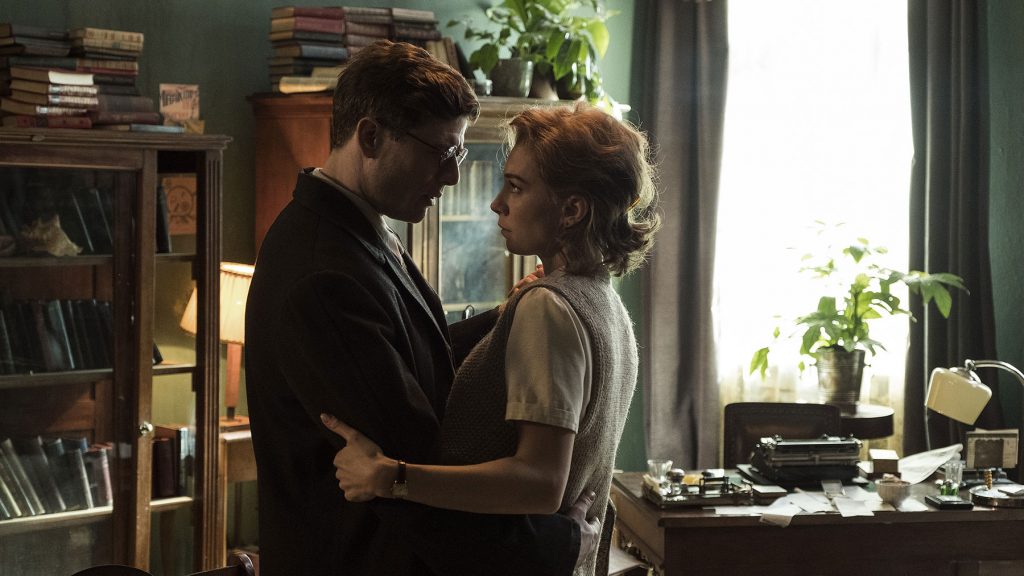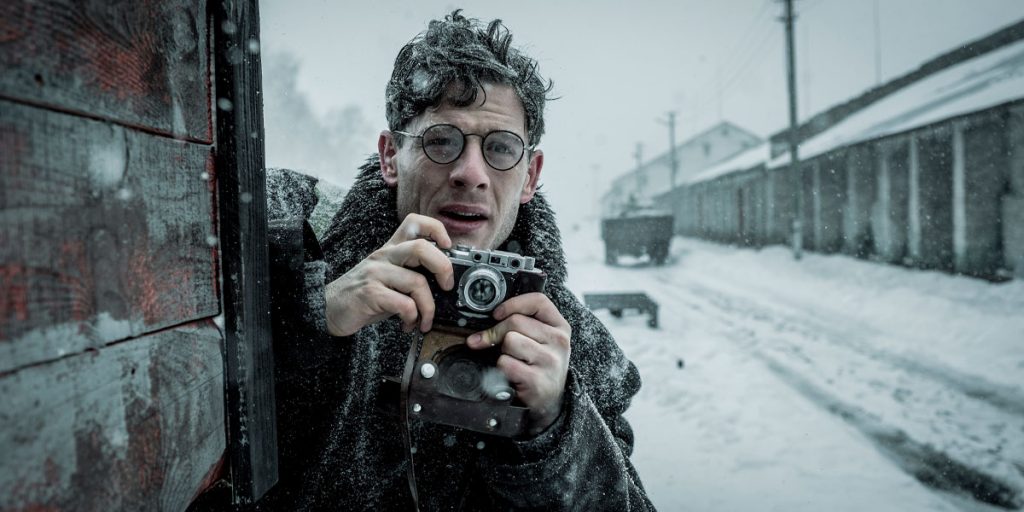Mr. Jones is a passionate but scattershot portrait of the 1930s in the Soviet Union, seen through the eyes of a daring journalist.
Mr. Jones is one of the most overstuffed movies I have ever seen. It is, among many other things, a biopic of Welsh journalist Gareth Jones, an expose of the corruption of New York Times 1930s Soviet reporter Walter Duranty, a portrait of the complexity of diplomacy in the era of Hitler’s ascension, a spy thriller, a bleak human drama about the Ukranian Famine-Genocide, and an origin story for the novel Animal Farm. It is the fodder of five seasons of a David Simon TV series, here compressed into just under two hours. If you are not enjoying a segment of the movie, just wait – it will shift genres again in a few minutes.
On paper, Mr. Jones is a conventional biopic: a reporter (James Norton of BBC’s Happy Valley) heads to 1933 Moscow with the hope of interviewing Joseph Stalin. While in Moscow, he breaks away from his Russian handlers to finagle his way into the Ukraine. It is there Jones learns the truth of the impoverishment of the Ukrainian people afflicted by the Stalin regime. He would go on to be one of the first Western journalists to report on the reality of the situation in the Soviet Union.
At times, Mr. Jones feels like a staid BBC miniseries, but at others it comes alive with vibrant creativity. One scene sees Jones dragged to a hedonistic party in Moscow populated by Western journalists and prostitutes. In these moments, Agnieszka Holland (Europa, Europa)’s direction springs to life. As half-nude call girls inject heroin and vodka is consumed like water, the camera gains speed and momentum. The movements become more staccato and the picture is sped up to a feverish pace. It feels like a young Danny Boyle has taken charge for a few minutes. I cannot help but think what sort of movie Holland could have made about the secret excesses of Soviet society.
There too is an undercurrent of dignified rage in Holland’s direction, here. Her disgust at the treatment of the Ukrainians is palpable, highlighted by an uncomfortably long sequence where Jones observes a pair of gravediggers recover the body of a woman who has starved to death while her toddler weeps uncontrollably nearby. The vignette culminates in the gravediggers adding the screaming child to the pile of bodies with nowhere else to put the babe and trudging off into the snow. The visual is stark, and absolutely damning.

The performers here are largely strong. Norton is a reasonably compelling lead presence, but his character is little more than a blandly honorable audience surrogate – a pure witness devoid of much recognizable humanity. Norton’s strongest moments are when the film leans into its spy movie influences. One sequence sees Jones falsify paperwork before bluffing his way by a Soviet bigwig – it is the film’s most energized sequence and the rare moment where Norton is allowed to show some humor. Vanessa Kirby (The Crown), always a welcome presence, is saddled with a role as a fellow journalist in Moscow that appears to have been brutally undercut in the editing room. Her interactions with Norton shift from cold to romantic and back again in mere moments, and the understated nature of her character leaves her performance feeling under baked, rather than reserved.
The film’s standout is Peter Sarsgaard. Playing a Times reporter not so secretly enamored with his sybaritic lifestyle in the country’s capital, Sarsgaard brings a jolt of unpredictability to his scenes. When he appears from amidst the debauchery of the aforementioned sex party wearing nothing more than his wooden leg, Sarsgaard brings the film a vibrant sense of chaos. It is the sort of performance that percolates with the sort of go-for-broke energy that teeters perilously close to scenery chewing without ever going over the line. This is the character I wanted to see for two full hours – his seduction by the Stalinists through debauchery and grift as his journalistic ethics slowly evaporate could have made for a fascinating and insightful view into the Soviet Union.
I think skewering a lack of historical accuracy can be a very lazy sort of critique. Yet, here, the moments of fictionalization are simply bizarre. Nothing I can find suggests the real Mr. Jones and George Orwell ever even met in real life, yet here their interactions serve as both an inspiration for Jones to share the truth of what he saw in Ukraine with the public and for Orwell to write Animal Farm. The film oddly elides over the fact that it took Orwell another dozen years and the experience of World War II to write his famed novel. It feels as though the elevator pitch to get financing for this film was “the secret origins of Orwell’s Animal Farm” and Holland, wisely, lost interest in the angle during production.
This review itself is not very long, but upon a re-read it feels as though it rambles and is unable to maintain focus on a single coherent thesis about the movie. It appears the structure of Holland’s film has had a similar effect on the cohesion of my thoughts about it. An interesting, worthy misfire.
Mr Jones is available to watch on digital and on demand.

